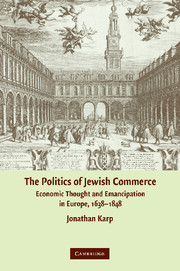Book contents
- Frontmatter
- Contents
- Acknowledgments
- Introduction
- 1 This Newfangled Age
- 2 From Ancient Constitution to Mosaic Republic
- 3 A New System of Civil and Commercial Government
- 4 The Natural Relation of Things
- 5 A State within a State
- 6 The Israelites and the Aristocracy
- 7 Jews, Commerce, and History
- 8 Capitalism and the Jews
- Afterword: Industrialization and Beyond
- Notes
- Bibliography
- Index
1 - This Newfangled Age
Published online by Cambridge University Press: 18 July 2009
- Frontmatter
- Contents
- Acknowledgments
- Introduction
- 1 This Newfangled Age
- 2 From Ancient Constitution to Mosaic Republic
- 3 A New System of Civil and Commercial Government
- 4 The Natural Relation of Things
- 5 A State within a State
- 6 The Israelites and the Aristocracy
- 7 Jews, Commerce, and History
- 8 Capitalism and the Jews
- Afterword: Industrialization and Beyond
- Notes
- Bibliography
- Index
Summary
The image of Shylock has dominated popular conceptions of the Jews' economic identity in early modern Europe. Shakespeare's creation, a usurer, is the key economic stereotype associated with the Jew. Yet although moneylending was a core motif of anti-Jewish literature in the sixteenth and seventeenth centuries (and beyond), the Jew was famous not just as a moneyman but as a merchant as well. In fact, from a historical standpoint, Shakespeare's antithesis between Shylock and Antonio (the actual “merchant of Venice”) is misleading. An actual Shylock, particularly if he had been a Sephardic Jew (i.e., a Jew of Iberian descent) residing in sixteenth-century Venice, could just as easily have been a merchant as a usurer. Indeed, he might even have been described in the same terms that Shakespeare used to describe Antonio, as possessing “an argosy bound to Tripolis, another to the Indies, … a third at Mexico, a fourth for England, and other ventures … squandered abroad.” Nor would Shylock the merchant have been unknown to Shakespeare's contemporaries. The Jew's reputation as a talented merchant preceded him – literally. Statesmen drew on it to design policies that afforded Jews residential privileges in return for their hoped-for commercial contributions. The Jews themselves, in the propaganda they produced to induce such invitations to settle, highlighted the mercantile and downplayed the usurious features of their national profile. In part, this was simply because moneylending was no longer the attraction it had once been.
Information
- Type
- Chapter
- Information
- The Politics of Jewish CommerceEconomic Thought and Emancipation in Europe, 1638–1848, pp. 12 - 42Publisher: Cambridge University PressPrint publication year: 2008
